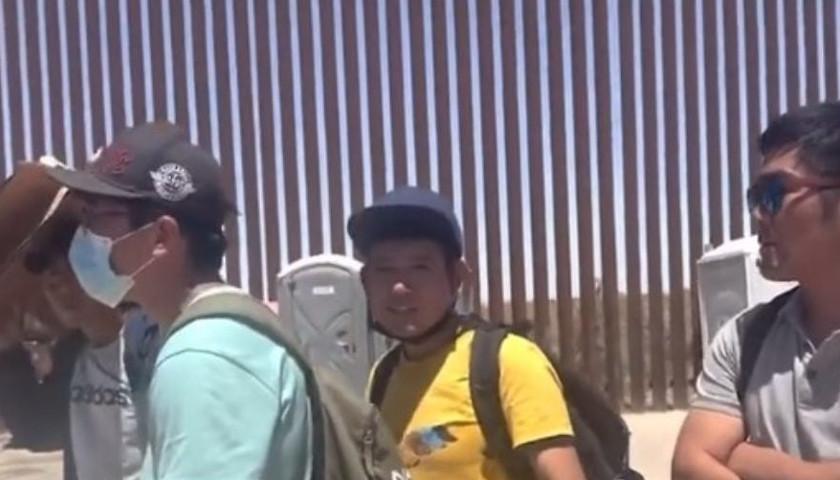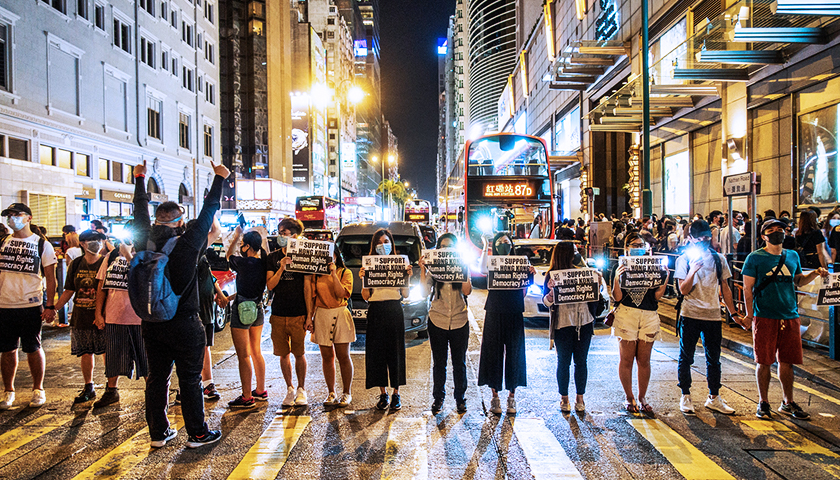The Texas Education Agency contracted with a virtual-tutorial marketing company through the end of the 2022-2023 school year that relies on tutorial services from VIPKids, the Beijing-based company backed by the Chinese technology conglomerate Tencent tied to surveillance and censorship.
“We believe all students deserve equal access to rigorous and engaging instruction,” said Michael Lombardo, the founder and CEO of BookNook. “We are confident that our efforts in Texas, in partnership with the Texas Education Agency, will have a meaningful impact on student performance.”
BookNook is the exclusive provider of K-8 literacy in the state.
Lombardo, a founding Advisory Council member of the My Brother’s Keeper Alliance, President Barack H. Obama’s signature initiative focused on supporting boys and young men of color, said BookNook is about collaborative learning.
“At the heart of BookNook is our commitment to collaborative learning. We believe that using synchronous learning technology can better support the important person-to-person interactions at the center of great instruction,” said the one-time fellow at the Honolulu-based East-West Center.
BookNook is now part of TEA’s Vetted Texas Tutor Corps, which is the program the education agency uses to address the new Texas law requirements that require accelerated tutoring for students who fail the State of Texas Assessments Academic Readiness tests.
The contract allows local education agencies to access the 600,000 tutorial licenses with BookNook paid for by the state.
The company did not say in its press release that the tutorial services are provided by the third-party provider VIPKids, founded in 2013 by Cindy Mi, which has raised more than $1 billion in 10 rounds since its founding, and much of it from Tencent.
According to BookNook’s privacy policies, VIPKids, and by extension, Tencent and the Chinese government, would have access to an incredible amount of personal data about the kindergarten through eighth-grade students, its tutors were working with, including: “Information and content submitted by a student, such as responses to questions, activities, assignments, and postings to a forum viewable by others in the same class.”
Students will also have their movements tracked:
Information collected through cookies, which are pieces of information stored directly on a user’s computer, and other persistent identifiers. We and our service providers use this information for security purposes, to facilitate navigation, to display information more effectively, to personalize your experience while using the Services, and to recognize your computer in order to assist your use of the Services. We also gather statistical information about use of the Services in order to continually improve their design and functionality, understand how they are used and assist us with resolving questions regarding them.
Who is Tencent?
Tencent is a Shenzhen, Guangdong, China-based technology investment company with stakes in more than 600 companies in which they invested more than $12 billion.
It is a portfolio that includes Universal Music Group, Warner Music Group, We Chat, and gaming companies, including Riot Games, producer of “League of Legends, and Epic Games, producer of “Fortnite,” and the music streaming services: Kugou, Kuwo, WeSing, QQ Music and Ultimate Music.
Tencent is also investing in movies, such as the long-awaited sequel, “Top Gun: Maverick,” starring Tom Cruise, which provides the most overt example of how its service to the Chinese Communist Party with the changes made to his leather jacket. In the original “Top Gun,” Lt. Peter “Maverick” Mitchell’s jacket has the flag of Taiwan and the flag of Japan, but in the sequel, the same jacket belonging to now-Captain Mitchell has neither flag.
Japanese and Taiwanese flags removed from Maverick's jacket in new Top Gun:https://t.co/wNsmWUQyaZ pic.twitter.com/Hxftw2Q1JW
— Kotaku (@Kotaku) July 23, 2019
In California, six WeChat users are suing Tencent for censoring them and surveilling them in the interests of the Chinese Communist Party. The suit claims significant financial, emotional, and psychological harm due to those practices and policies.
Christopher A. Ford, who was then the assistant secretary of state, heading the Bureau of International Security and Nonproliferation, said at a Sept. 11, 2019, Multilateral Action on Sensitive Technologies Conference in Washington, the problem is that Tencent, among other Chinese technology giants, are now tools of the Chinese Communist Party, for its military for surveillance and social control of the population.
“Huawei and other Chinese tech companies such as Tencent, ZTE, Alibaba, and Baidu are thereby used to reinforce the government’s surveillance efforts,” Ford said.
“As these companies export their products and services to the rest of the world, the security and human rights problems associated with this ‘China Model’ are progressively exported with them,” he said. “Already, it has been reported that Ecuador, Venezuela, and Pakistan, among others, have become customers for such firms’ repression-facilitating technologies.”
Ford said this was not a new thing:
Back in the days of Mao Zedong, the iron grip of pervasive Party social and political control in China had to be maintained with the help of sons who would rat out their fathers for ideological nonconformity, students who would denounce their teachers for political crimes, neighborhood mutual-vigilance committees, public self-criticism sessions, mass imprisonment, and secret executions for which families would be sent a small bill to cover the cost of the bullet.
By contrast, the Chinese regime’s social control techniques in this era of Big Data are growing vastly more sophisticated and, in a sense even more deeply pervasive than ever – with a goal to construct an almost literally omnipresent surveillance state with sweeping opportunities for forms of electronically-facilitated coercion that are both exquisitely tailored to individual citizens and massively scaled for a population of more than a billion people. This is the frightening information-managed dystopia described by Samantha Hoffman as “Techno-Enhanced Authoritarianism.”
VIPKids censors content, teachers
Tencent joined at least two VIPKids’ fundraising rounds in a $200 million tranche in 2017 and a $500 million tranche in 2018. The last round had investors buying into VIPKids at a $3 billion valuation.
These VIPKids investments were directed for Tencent by its managing partner Lin Haifeng, who said after the $500 million round: “Tencent attaches great importance to investment in online education. We hope to have close cooperation with our most important partners like VIPKID and to help the Chinese education industry explore the global market and the boundaries and possibilities of education.”
Soon after that last round was completed, The Wall Street Journal reported that VIPKids put hundreds of its teachers on notice for crossing the line regarding China.
This atmosphere was also described by a VIPKids tutor “Fiona,” who runs the blog “VIPKidding.”
In her March 24, 2020 post, Fiona shared how she deals with the censorship of topics sensitive to the government of Red China.
“Yes, there is an entire unit on landmarks in level 4 that shows Tienanmen (sic) Square. DO NOT START TALKING ABOUT THE PROTESTS AT TIENANMEN SQUARE,” she wrote.
“Be sure any maps you use don’t have Tibet or Tiwan (sic) in a separate color than China,” she wrote. “Yes, they’re nuts, I get it. I get around this by using a colorless map. Tiwan is still outlined, but if it’s black and white, no one can tell the difference anyway.”
Fiona wrote that it is best to teach and not get hung up on politics.
“Many new teachers face new issues with VIPKid that they hadn’t considered. Everything from maps to religion to history” she wrote.
“Don’t get bogged down in these topics – as much as we would all like to be justice crusaders, your job is to teach them English, teach them a little culture, and maybe point out that there are differences everywhere across the globe.”
– – –
Neil W. McCabe is a national political correspondent for the Star Newspaper Group based in Washington and a Media Fellow at the Gold Institute for International Strategies. Before joining the Star News Network, he was a White House and Capitol Hill reporter for One America News. His special “Biden Family Corruption” was the highest-rated special in the channel’s history. McCabe was the Capitol Hill correspondent for Breitbart News, where he also wrote up the 2016 Breitbart-Gravis polls. McCabe’s other positions include a senior reporter at Human Events and a staff reporter at The Pilot, Boston’s Catholic paper. McCabe also was the editor of The Somerville News, The (North Cambridge, Mass.) Alewife and served as an Army combat historian in Iraq. His 2013 e-book “The Unfriendly Skies” examined how the American airline industry went from deregulation in the late 1970s to come full circle to the highly-regulated, highly-taxed industry it is today.






Where is Governor Abbott and his AG Paxton? Shut this garbage down.